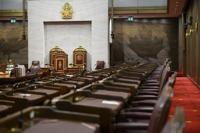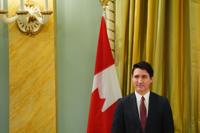OTTAWA - A federal inquiry into foreign interference has yet to present its initial report, but the Liberal government is already advancing plans to overhaul a suite of national security laws and procedures.
In a pair of new reports, the government says recent consultations found general support for measures to respond to foreign meddling, along with some concerns about the potential effects on vulnerable communities.
Ottawa is eyeing the creation of new foreign interference offences under the Security of Information Act, as well as modernization of Canada's sabotage offence.
The changes could include making it a crime to carry out a covert or deceptive act for the benefit of a foreign entity, knowing it would cause harm to Canadian interests.
The offence would expand the scope of the current Security of Information Act, which currently relates to foreign-influenced threats or violence.
One example could be knowingly helping agents of a foreign state, who are posing as tourists, enter Canada, the government says. Another example could be planting false stories to discredit a critic of a foreign government.
A newly released report on this element of the consultations says there were varying viewpoints on the details of how to combat foreign interference, but a "general consensus on the need for increased efforts" to address the threat.
The government is also looking at changes to the legislation governing the Canadian Security Intelligence Service, to expand the spy agency's ability to share information, collect intelligence and use data.
A key change would allow CSIS to disclose information beyond the halls of government to build resiliency against foreign interference.
Other new provisions would permit CSIS to compel the preservation of perishable information when it intends to seek a warrant, and to compel production of information that is likely to further its investigations.
Other changes would enhance the spy service's ability to collect foreign intelligence as well as gather and use datasets in a timely way.
The Business Council of Canada wants CSIS to be able to share threat intelligence with companies to help them take protective measures. It has also urged the government to create a new body that would ensure the intelligence is securely and broadly shared across the Canadian economy.
Serious issues must be addressed, particularly concerning threats to individuals and interference with essential services that put the health and safety of people at risk, said the Ottawa-based International Civil Liberties Monitoring Group, a coalition of 45 organizations including Amnesty International, the Council of Canadians, the Canadian Muslim Forum and several prominent unions.
"However, we are concerned that the overall approach to this issue to date has focused on greater securitization, greater police and intelligence agency powers, and has raised concerns around the targeting and marginalization of specific communities and worries of a new 'McCarthyism' focusing on individuals with ties to particular countries based on political divisions and not actual threat," said a submission from the group.
A report on the CSIS Act consultations says participants "generally understood" the need for changes and agreed that existing gaps are problematic.
"While support was strong overall, some respondents expressed specific concerns regarding the importance of privacy and the need for strong oversight and accountability. Contributions also emphasized the importance of continued efforts to enhance trust in CSIS and encouraged continued efforts to increase transparency even further."
The newly issued summaries of the consultations do not satisfy the civil liberties monitoring group's concerns that many of the proposals will have effects "far beyond addressing foreign interference, and that framing them as such may have limited which individuals and organizations chose to participate," said ICLMG national co-ordinator Tim McSorley.
For example, he said, changes to CSIS's foreign intelligence powers or the agency's dataset regime may certainly intersect with foreign interference, but would have much broader implications.
States might engage in interference to advance foreign political goals, and can employ people to act on their behalf without disclosing ties to the foreign state.
Some believe that requiring these individuals to formally register with the government they are trying to influence, with the possibility of fines or even prison time for failing to comply, can make such dealings more transparent.
An earlier public consultation found support last year for establishing a foreign influence transparency registry, but participants stressed a need for clarity on how it would work.
There has been no obvious federal movement on the idea since.
A federal inquiry into foreign interference is expected to soon deliver a report on allegations of meddling in the last two general elections.
The report from commissioner Marie-Josûˋe Hogue will contain findings and recommendations that could spur calls for additional changes to protect the integrity of Canadian electoral processes.
McSorley said the government needs to seek additional input and advice from interested players and experts before moving ahead with legislation, particularly concerning the necessity of some of the proposed changes and their effects on Charter-protected rights.
He said such work should include holding the required five-year review of the last major changes to national security legislation, adopted in 2019 ã a review due to take place this year.
This report by üСÜꪤüýò¿Øéóæòêü was first published April 29, 2024.








































